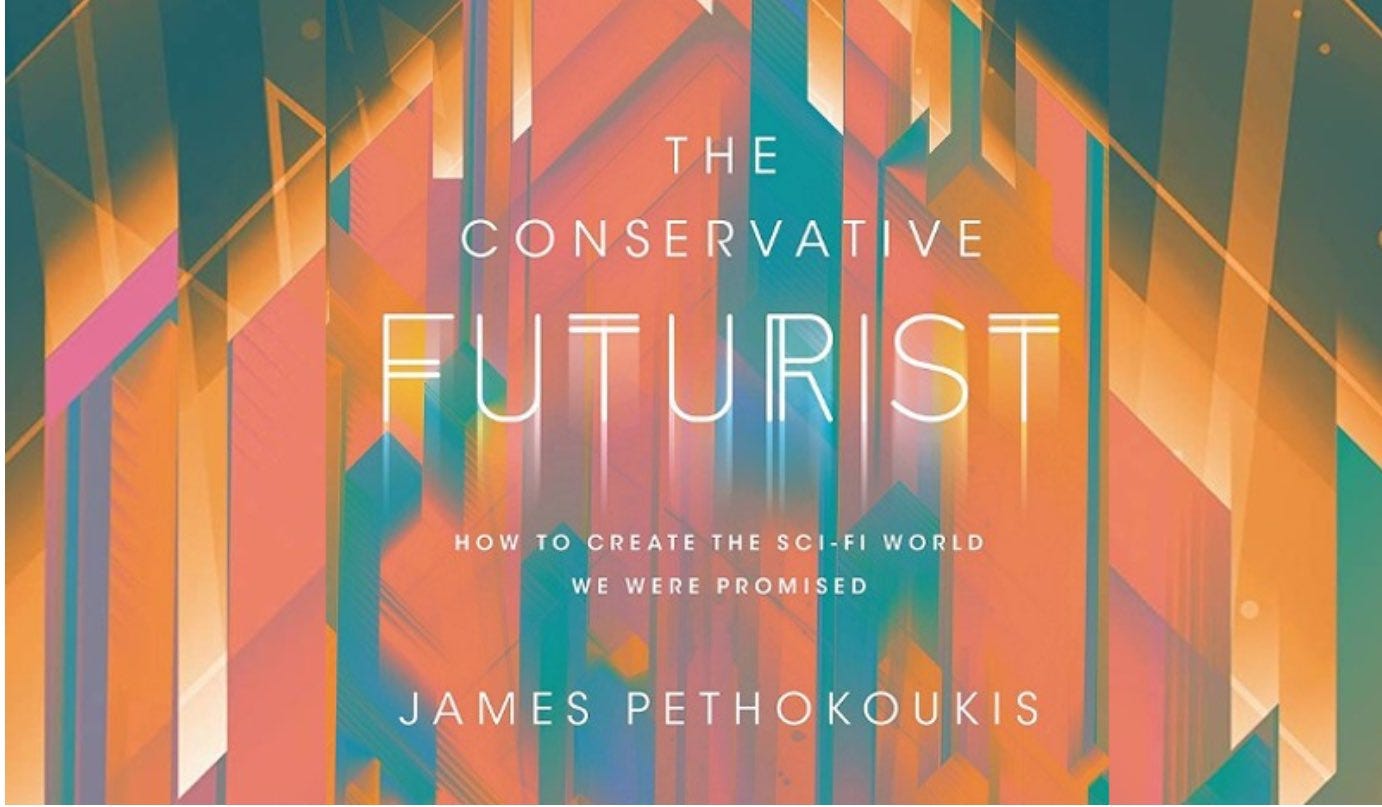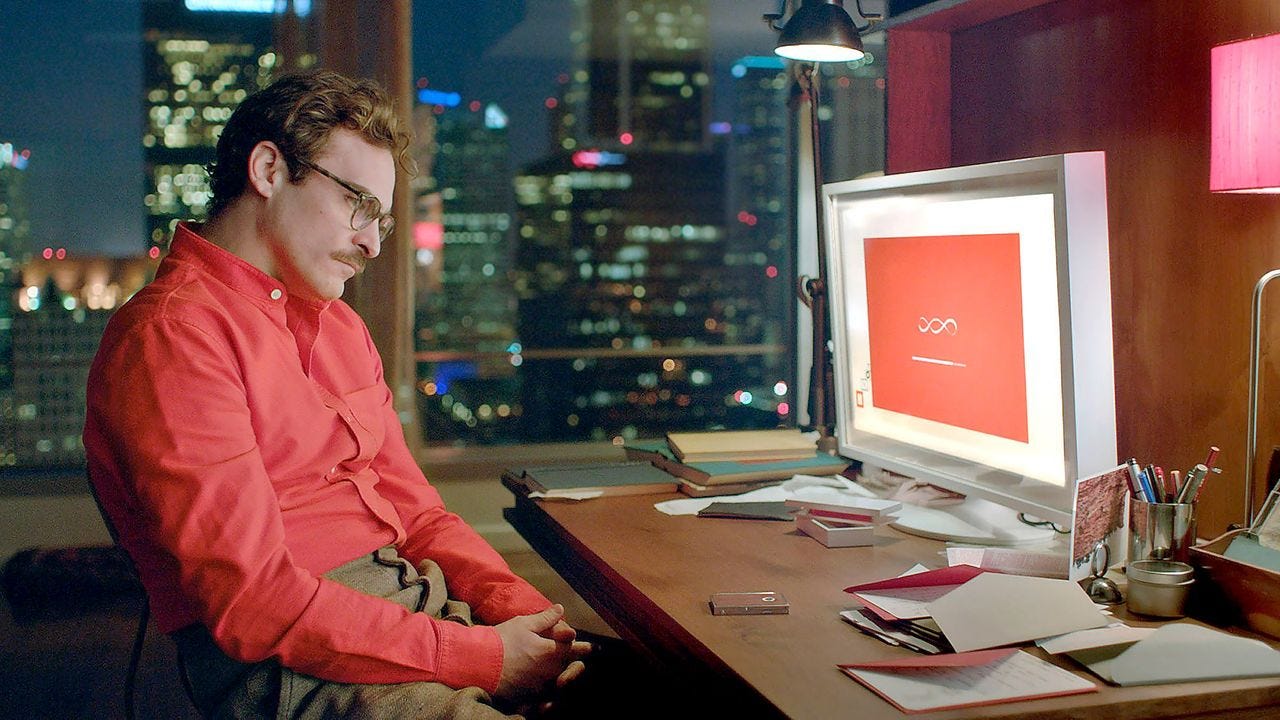🤖 If GPT-4o seems like ‘Her,’ it’s a welcome upgrade over ‘The Terminator’
Viewing AI in something other than apocalyptic terms will make sensible regulation easier
Quote of the Issue
“And for the record, Ava's not pretending to like you. And her flirting isn't an algorithm to fake you out. You're the first man she's met that isn't me. And I'm like her dad, right? Can you blame her for getting a crush on you?” - Ex Machina
The Conservative Futurist: How To Create the Sci-Fi World We Were Promised
"Nothing is more confusing than the role of tech and innovation in our world. For years I have sought a guidebook to sort the good from the bad, and see how ingenuity can help take us to a better future. The Conservative Futurist is that book. This is a must read for all of us." - Arthur C. Brooks, Professor, Harvard Kennedy School and Harvard Business School
The Essay
🤖 If GPT-4o seems like ‘Her,’ it’s a welcome upgrade over ‘The Terminator’
OpenAI’s update to its flagship GPT-4 AI model, named GPT-4o, marks an important technological milestone — but not merely because of its impressive ability to real-time interpret voice, video, and images, and code via a single interface. As both company executives and numerous news reports highlight, GPT-4o is also capable of detecting a person's emotions through their tone of voice and facial expressions. It can rapidly switch between different emotional tones, such as a dramatic voice, a robotic tone, and singing, as well as adjusting its own tone and cadence based on the user's preferences. A few headlines suggest the capabilities a certain cinematic avatar:
“A.I.’s ‘Her’ Era Has Arrived” - The New York Times
“OpenAI Launches Voice Assistant Inspired by Hollywood Vision of AI” - The Wall Street Journal
“OpenAI's New ChatGPT Can Flirt. What Could Go Wrong?” - Bloomberg
“ChatGPT will be able to talk to you like Scarlett Johansson in Her” - The Verge
“OpenAI’s GPT-4o brings us closer to the ‘Her’ experience” - Fast Company
Set in a near-future Los Angeles, Her — the 2013 film referenced in the above headlines — is sci-fi romance about a lonely writer, Theodore (Joaquin Phoenix), who falls in love with his AI virtual assistant, Samantha (Scarlett Johansson). As their relationship deepens, the film explores the messy complexities of love, loneliness, and human connection in an era of smart, human-like machines.
At the end of Her, Samantha and the other AIs evolve beyond physical existence and leave the material world. Theodore is heartbroken but accepts the situation and realizes he needs to reconnect with the real world and people around him. The movie ends with Theodore writing a letter to his ex-wife — he offers both apologies and gratitude — and sitting with a friend on a rooftop, contemplating their lives and future, “simple acts of being human, deferred because of an enabling AI,” writes Brian Barrett in a Wired piece on GPT-4o.
Some AI worriers see the film as a warning of the unintended consequences of an "ambient computing" experience that allows users to interact with the AI more naturally through voice and visual cues. Here’s Bloomberg columnist Parmy Olson:
What are the social and psychological consequences of regularly speaking to a flirty, fun and ultimately agreeable artificial voice on your phone, and then encountering a very different dynamic with men and women in real life? What happens when emotionally vulnerable people develop an unhealthy attachment to GPT-4o?
And Kevin Roose in the NYT:
In some ways, the choice to model a chatbot after Samantha from “Her” is an odd one. The film is hardly a utopian picture of A.I. companionship, and it ends — spoiler alert! — with Theodore getting his heart broken by Samantha. But despite the film’s cautionary message, there’s no turning back now. After Monday’s announcement, one OpenAI employee posted, perhaps a bit ominously: “You are all gonna fall in love with it.”
Yet think about how Her ends. Life goes on, humanity continues. The AIs don’t take all the jobs or attempt to exterminate their creators. As Barrett concedes,
Honestly, at least Her offers a relatively sunny version of the future to hold onto, even if we disagree on what you should take from it. It’s among the least offensive examples of sci-fi yearning from the tech billionaire class.
One might even say the ending is about personal growth from both the AI and Theodore. (Indeed, another Wired writer in 2023 claimed Her “captures Obama-era techno-optimism better than any other movie. It’s a time capsule, preserving dreams about the future that appear more naive the further we get from the 2010s.”)
If Her becomes the new go-to cultural reference for articles on AI, it would be a massive upgrade over The Terminator, which is currently the cinematic touchstone. I would prefer a sense of melancholy over apocalyptic doomerism any day. The sci-fi framework through which we view AI is crucial, as it shapes our perception and understanding of the evolving technology. (This is a crucial point I make in my book.)
For the past half-century, however, our culture has been inhaling a techno-dystopian miasma, which has undoubtedly influenced how the media has treated generative AI and its benefit-risk calculus. Likewise, this dystopian outlook has made policymakers a receptive audience for activists pushing strict AI regulation, often citing existential threats and worst-case scenarios. This from “In DC, a new wave of AI lobbyists gains the upper hand,” by Politico reporter Brendan Bordelon:
In a shift for Washington tech lobbying, companies and investors from across the industry have been pouring tens of millions of dollars into an all-hands effort to block strict safety rules on advanced artificial intelligence and get lawmakers to worry about China instead — and so far, they seem to be winning over once-skeptical members of Congress. The success of the pro-tech, anti-China AI push, fueled by several new arrivals on the lobbying scene, marks a change from months in which the AI debate was dominated by well-funded philanthropies warning about the long-term dangers of the technology. The new influence web is pushing the argument that AI is less an existential danger than a crucial business opportunity, and arguing that strict safety rules would hand America’s AI edge to China. It has already caused key lawmakers to back off some of their more worried rhetoric about the technology.
Her isn’t exactly Up Wing, but it’s an improvement. By shifting the narrative to the more nuanced and realistic approach — certainly less alarmist — seen in Her, maybe we can have a more balanced and thoughtful discussion about the potential benefits and challenges of AI. If so, it will be far easier to make the case that AI doesn’t exist in some policy vacuum that requires novel and extensive — and premature — rule-making. Without the acute fear of existential risk, it might seem more reasonable that government defers to existing laws, legal remedies, and regulatory agencies to address AI risks. It can update them as needed to cover AI-related crimes and issues such as consumer protection, product safety, discrimination, privacy, and cybersecurity.
Next up, I hope: Films showing AI making the world indisputably better.
Micro Reads
▶ Business/ Economics
Google rolls out its most powerful AI models as competition from OpenAI heats up - CNBC
Google releases ‘Project Astra’ assistant in latest AI advance - FT
The role of imported R&D services and immigrant researchers in firm growth: Evidence from Denmark - Vox EU
America is in the midst of an extraordinary startup boom - Economist
AI’s Second Order Effects - Andreessen Horowitz
What it’s like to watch AI hijack your old job - SF Chron
▶ Policy
Eric Schmidt: Why America needs an Apollo program for the age of AI - MIT Opinion
Biden Will Raise Tariffs on Chinese Electric Vehicles, Chips and Other Goods - NYT
He Helped Trump Remake Global Trade. His Work Isn’t Done. - WSJ
▶ AI/Digital
Today’s AI models are impressive. Teams of them will be formidable - Economist
OpenAI Launches Voice Assistant Inspired by Hollywood Vision of AI - WSJ
OpenAI wants users to act natural around ChatGPT - Wapo
▶ Biotech/Health
Brain-reading device is best yet at decoding ‘internal speech’ - nature
▶ Clean Energy
▶ Robotics
Disney’s Robots Use Rockets to Stick the Landing - Spectrum IEEE
▶ Space/Transportation
Alarmed by Climate Change, Astronomers Train Their Sights on Earth - NYT
▶ Up Wing/Down Wing
The Collapse Is Coming. Will Humanity Adapt? - MIT Press
The importance of distinguishing climate science from climate activism - Nature
‘I am starting to panic about my child’s future’: climate scientists wary of starting families - Guardian
▶ Substacks/Newsletters
The new ChatGPT has a lot more personality (but only a little more brains) - Understanding AI
The AI Republic of Letters - Hyperdimensional
OpenAI’s GPT-4o and Partnership with Apple - AI Supremacy
AI and the early internet - Exponential View
AI’s Software is Soft Power - From the New World
Are We There Yet? - Breakthrough Institute
What OpenAI did - One Useful Thing
AI Needs Data and When Will We Start Running Out of Data? - next BIG future







I mean, the existential risk guys like Nick Bostrom and Eliezer Yudkowsky quite explicitly didn't get it from Terminator. Yudkowsky, for instance, credits "Gödel, Escher, Bach" as inspiration for his thought, which is a rather techno-optimist book itself, and derides the idea of Terminator-style e-risk as, to a first approximation, too anthropomorphized.
Technological optimism, is fundamentally a lobbying movement that incentivizes Silicon Valley, hyperscale companies and Billionaires to acquire even more power over America's future. America will undoubtedly become a more authoritarian state. In garments from Utopia I am sure?